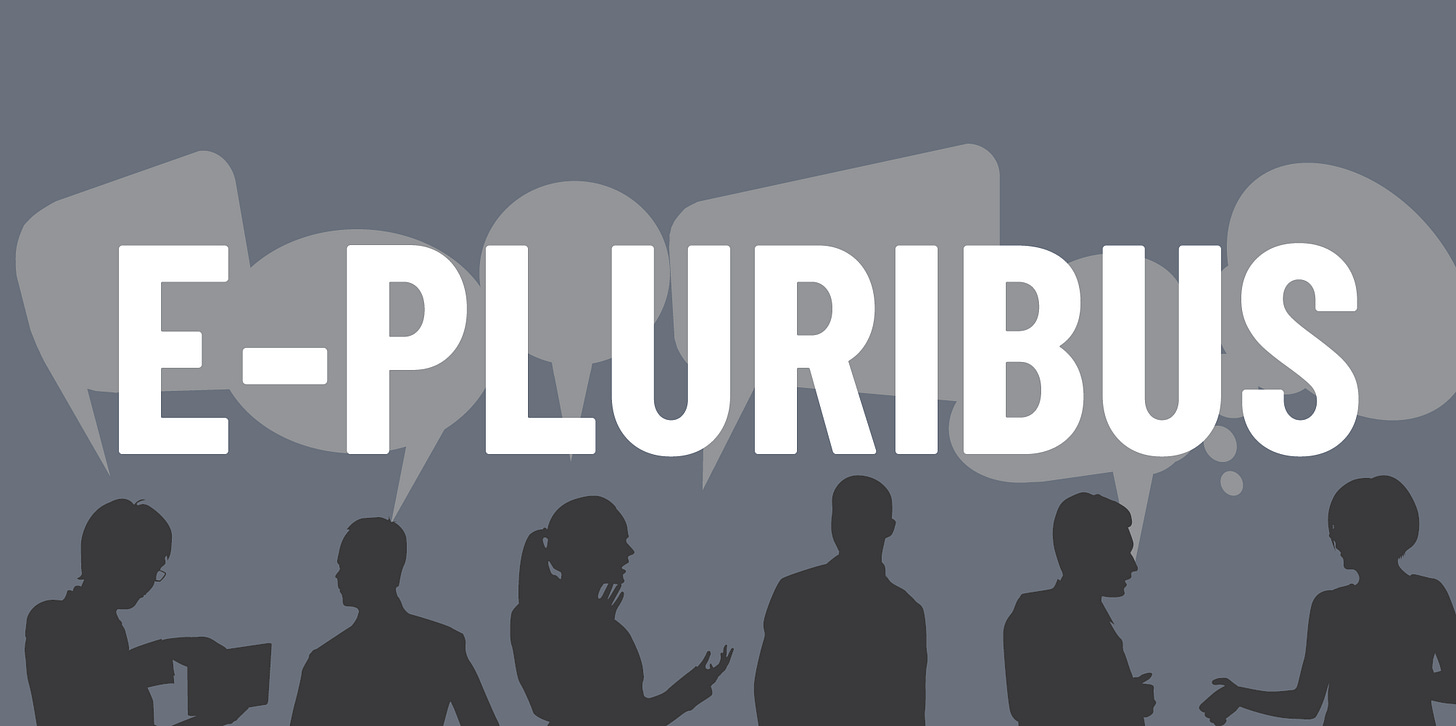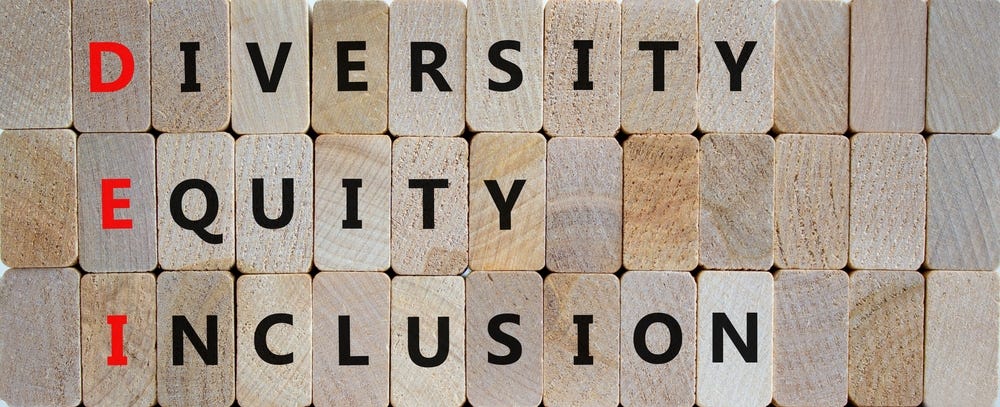E-Pluribus | May 17, 2022
Diversity, Inclusion, Equity and conformity; political litmus tests for college faculty; and what drives cancel culture.
A round-up of the latest and best writing and musings on the rise of illiberalism in the public discourse:
Robert Weissberg: Bending the Knee for Diversity, Inclusion, and Equity
Robert Weissberg, a former political science professor (now emeritus) at the University of Illinois-Urbana, writes for Minding the Campus about that school’s efforts to force sameness and conformity upon its faculty. Weissberg speculates that frustration with a lack of progress in and an ever-growing, self-perpetuating DIE (or DEI) bureaucracy are prompting advocates to double down on efforts
[A]ll [University of Illinois-Urbana] professors up for tenure or promotion—including those in the hard sciences such as physics and engineering–must submit a statement about their personal commitment to diversity. Currently, this is voluntary, but it will soon be mandatory.
According to the University’s Provost, the university must “catalyze innovation and discovery, find novel and proactive ways to educate students from all walks of life, and develop ever-deeper connections with the public we serve.” In their diversity statements, candidates should “include a discussion of the context, importance, and impact of their contributions along with their future plans for contributions. The candidate may choose to organize the statement by topic, activity, domain (e.g., research, teaching, and service), or in another manner.”
In other words, even if you are teaching electrical engineering, be prepared to be judged by how you contribute to the campuses’ “…diversity, equity, and inclusion activities and their impact.”
[. . .]
Unfortunately, there is a more troubling side to this wasteful endeavor than just increasing an already bloated bureaucracy. As the DIE orthodoxy grows ever more totalitarian it will become increasingly necessary to uncover heretics who must be publicly crushed to teach all the others to bend the knee and obey. Recall the Soviet Union when commissars scanned the audience to spot those who were the first to stop clapping after Stalin’s speeches.
Now, while nearly all professors will obey and dutifully offer up boilerplate cliches to satisfy the diversity apparatchiks, a few will object and, sin of sin, even proclaim that promoting racial Equity has zero to do with teaching students to grow soybeans. And rest assured, the response to this heretic’s transgression will not be a reasoned rejoinder; rather, our heretic will be informed that he is misinformed and a troublemaker and if he wants future research funding, he better get with the program.
Read the whole thing.
John D. Sailer and Ray M. Sanchez: An Overt Political Litmus Test
Diversity, equity and inclusion initiatives are very common at individual institutions of higher education, but governing bodies overseeing such institutions (such as accreditation organizations) are getting into the act as well. John Sailer and Ray Sanchez write at City Journal about how the California Community Colleges is setting a new (and concerning) standard in the field with its comprehensive new proposal.
While DEI requirements are quickly becoming common, CCC’s [California Community Colleges] proposal stands out for its thoroughness and ideological aggressiveness. It defines “cultural competency” as “the practice of acquiring and utilizing knowledge of the intersectionality of social identities and the multiple axes of oppression that people from different racial, ethnic, and other minoritized groups face.” It calls for all community college districts to “include DEIA competencies and criteria as a minimum standard for evaluating the performance of all employees” and “place significant emphasis on DEIA competencies in employee evaluation and tenure review processes to support employee growth, development, and career advancement.”
The Chancellor’s Office also provides a list of competencies. Some of them: “Includes a DEI and race-conscious pedagogy,” “Contributes to DEI and anti-racism research and scholarship,” and “Engages in self-assessment of one’s own commitment to DEI and internal biases, and seeks opportunities for growth to acknowledge and address the harm caused by internal biases and behavior.”
Requiring faculty to embrace the politically-charged concepts of “intersectionality” and “multiple axes of oppression” clearly violates academic freedom—but the CCC system seems unperturbed by that prospect. Last year, a workgroup for the system’s curriculum committee created guidelines called “DEI in Curriculum: Model Principles and Practices,” which explain what “DEI and race-conscious” pedagogy looks like in practice. One of the document’s recommended “culturally responsive classroom practices” reads: “Protect the cultural integrity of an academic discipline to support equity by no longer weaponizing ‘academic integrity’ and ‘academic freedom’ that impedes equity and inflicts curricular trauma on our students, especially historically marginalized students.”
Read it all.
Rob Henderson: What Propels Cancel Culture?
In April 2020, Rob Henderson wrote an essay on cancel culture for Psychology Today. This week, he shared a version of the article online at his Substack. Henderson believes that things have gotten worse since he wrote it, but his thoughts on some of the motivations of the phenomenon are still useful.
Cancel culture refers to ending (or attempting to end) an individual’s career or prominence to hold them to account for immoral behavior. Driven primarily by young progressives, often through social media, cancel culture has attracted controversy since it swept into the national conversation.
In seeking to impose long overdue consequences for unacceptable behavior, cancel culture has sparked critical discussions about cultural norms and contributed to the downfall of serial predators such as Harvey Weinstein, Kevin Spacey, and Bill Cosby. It has given voice to those with no other way to hold powerful figures accountable.
But the phenomenon has elicited critiques as well. The swift and decisive nature of cancel culture can stifle debate, and some believe that dialogue is a more productive way to foster change. Others believe it has gone overboard, unleashing equal outrage against individuals who commit serious crimes and those with relatively minor missteps. Perhaps society should be more forgiving, allowing people to atone for past transgressions.
[. . .]
[M]odern life is so comfortable that people are rarely presented with serious challenges to survival. Thus, people have fewer chances to prove themselves to their communities, which makes it harder to distinguish real and false friendships.
This is where cancel culture comes in. Expressing anger at someone who commits a moral infraction demonstrates commitment to a group, and uniting against a perpetrator demonstrates loyalty to the group’s values. Even if the group is unsuccessful at canceling someone, the failure presents additional opportunities for both status and bonding: What or who is preventing the target from being taken down? The group can unite around this question.
Read it all here.
Around Twitter
The Foundation for Individual Rights in Education warns that a definition in proposed legislation in California regarding sexual harassment training is so broad as to potentially include “a single unwanted request for a date [or] a joke” and is clearly unconstitutional:
Thomas Chatterton Williams with an observation on the difficult of meaningful discourse when the meaning of even shared terminology cannot be agreed upon:
A short thread from a frustrated Robby Soave on what is known about the Buffalo grocery store shooter’s history and why see something-say something doesn’t always work:
And finally, Matt Yglesias poses a (so far unanswered) question for potential new Twitter owner Elon Musk on how far “uncensored” might go on a Musk-owned platform:









